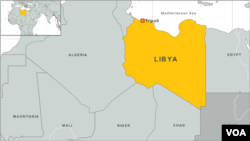TRIPOLI —
A loud explosion was heard near a building housing several foreign embassies in the Libyan capital Tripoli on Tuesday, a witness said.
The explosion occurred in the car park of a residential compound next to Tripoli Towers, where the British and Canadian embassies as well as several foreign airlines and other companies are based.
It was not immediately clear what caused the blast, but a source working in the building said it could have been a car bomb.
“I heard an explosion and looked outside and saw a car in flames,” he told Reuters.
The blast occurred in mid-afternoon, when many offices have already emptied during the fasting month of Ramadan. Security officials were not immediately reachable for comment.
There has been a spate of bombings in recent months in Libya - in April the French Embassy in Tripoli was bombed, while in the volatile eastern city of Benghazi, four Americans - including the ambassador - were killed on Sept. 11 last year.
Armed violence and lawlessness caused in part by militia groups who often do as they please has hobbled governance in wide areas of the oil-producing North African state following the 2011 war that ousted dictator Muammar Gaddafi.
The explosion occurred in the car park of a residential compound next to Tripoli Towers, where the British and Canadian embassies as well as several foreign airlines and other companies are based.
It was not immediately clear what caused the blast, but a source working in the building said it could have been a car bomb.
“I heard an explosion and looked outside and saw a car in flames,” he told Reuters.
The blast occurred in mid-afternoon, when many offices have already emptied during the fasting month of Ramadan. Security officials were not immediately reachable for comment.
There has been a spate of bombings in recent months in Libya - in April the French Embassy in Tripoli was bombed, while in the volatile eastern city of Benghazi, four Americans - including the ambassador - were killed on Sept. 11 last year.
Armed violence and lawlessness caused in part by militia groups who often do as they please has hobbled governance in wide areas of the oil-producing North African state following the 2011 war that ousted dictator Muammar Gaddafi.





